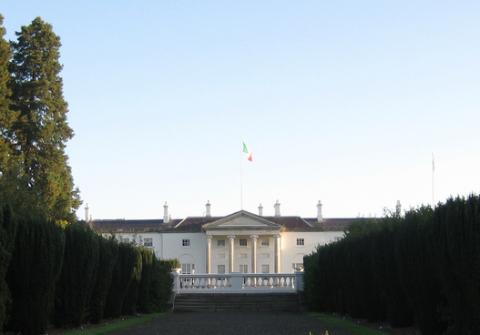A whole lotta nothing, or: the meaning of the Áras race

There is a void at the core of the Irish presidential election. To understand the meaning of the election – if not necessarily the role of the presidency itself – one must understand that at one and the same time nothing is at stake and everything is of huge enormity.
The race for the Áras is an exercise in vacuity as well as collective narcissism, one which allows the Irish body politic project its moral, political and economic anxieties into an empty cupboard where they can arrange them at will to suit them.
Looking at the race itself, one sees very little to get enthusiastic about. The candidates are an anodyne bunch who are well aware they cannot commit to anything of real political import or significance. If candidates betray any ideological commitments they are immediately susceptible to accusations of misunderstanding the limits of the role.
Bunreacht na hÉireann is, after all, unambiguous as to the functions of the president. Article 13.9 states: “The powers and functions conferred on the President by this Constitution shall be exercisable and performable by him only on the advice of the Government, save where it is provided by this Constitution that he shall act in his absolute discretion or after consultation with or in relation to the Council of State.” Even Article 13.10, which states that the President may have additional powers and functions conferred on them by law is subsequently delimited by Article 13.11, which states any additional power or function may only be used on Government advice.
In fact the entire constitutional remit of the president is wholly subordinate to either government or the Council of State. The presidency is therefore a static institution impotent in delivering meaningful change to people’s lives. Essentially, the presidential election is a version of the Rose of Tralee. It is a beauty pageant where the candidates must have the purest mandate and a “truth in [their] eyes ever dawning”; they must be ideal models as well as wholly innocent to attain the required disinterestedness.
This explains the intense scrutiny and mudslinging which customarily accompanies each election. The best candidate is the one that divests themselves most adeptly of political contaminants. Indeed, this also explains Sean Gallagher’s surprise poll success. His slogans – “self-belief, self-confidence and self-determination”; “community-minded, enterprise-friendly and socially-included Ireland” – shy away from politics, preferring meaninglessness.
The president is precisely apolitical or at least is regularly asserted to be above politics. In politics it would normally be considered an impediment to electoral success if candidates were not impassioned by a coordinated moral vision. In the Irish presidential election, the lack of such a vision is a virtue. Candidates must present themselves as ethereal and immune from the urgencies of everyday life.
This is the exact opposite of political life in Ireland. Realpolitik aside, Irish political life prides itself on grist and strife. This requires shrewdness, flexibility, courage, negotiation and compromise. This is the opposite of the naivety and innocence all presidential candidates are obliged to exhibit.
Irish political life is governed by those politicians who get their hands dirty, and do the necessaries for the constituency. It is a murky world of negotiation and compromise. The president must remain lofty and disinterested, devoid of anything that is individually or collectively of value.
This is not to say that within the context of Irish politics, the presidential election is unimportant. That the presidency is a void, and nothing more than a symbol, does not undermine the fact that symbols are potent. If the presidency is simply ceremonial, the election itself represents the vacuity of ideals at the core of Irish political life.
That the president is politically neutered has one very important consequence in that it actively reinforces a separation between the political and the ideal within the Irish body politic. The general election deals with real politics, whereas the presidential election deals with lofty aspiration. While the election of president may suffer from an emptiness of significance for the Irish electorate, it is important if only for the reason that it is a barometer of the moral atmosphere of Irish civic society. The election is in effect a plebiscite on the state of the nation and an effort in reassuring the state of its innocence.
The election is important, if not necessarily the presidency. Once the president takes office this symbolism of the role ceases to matter, since the president is precisely removed from that which the Irish public are enmeshed in, and that is living with consequences of political decisions.
Image top: René Slaats.
